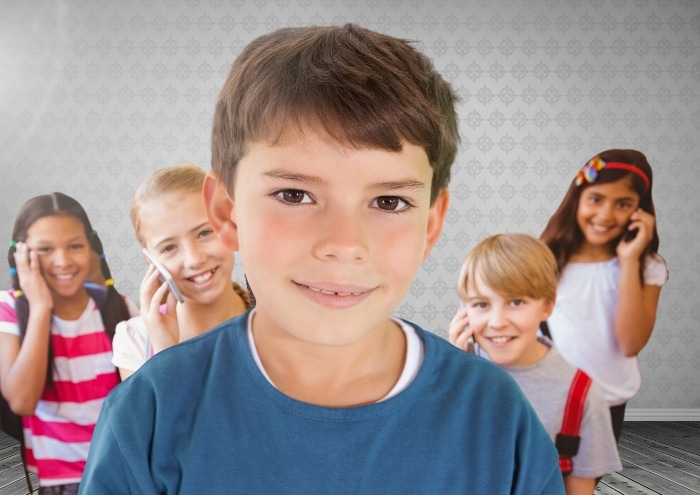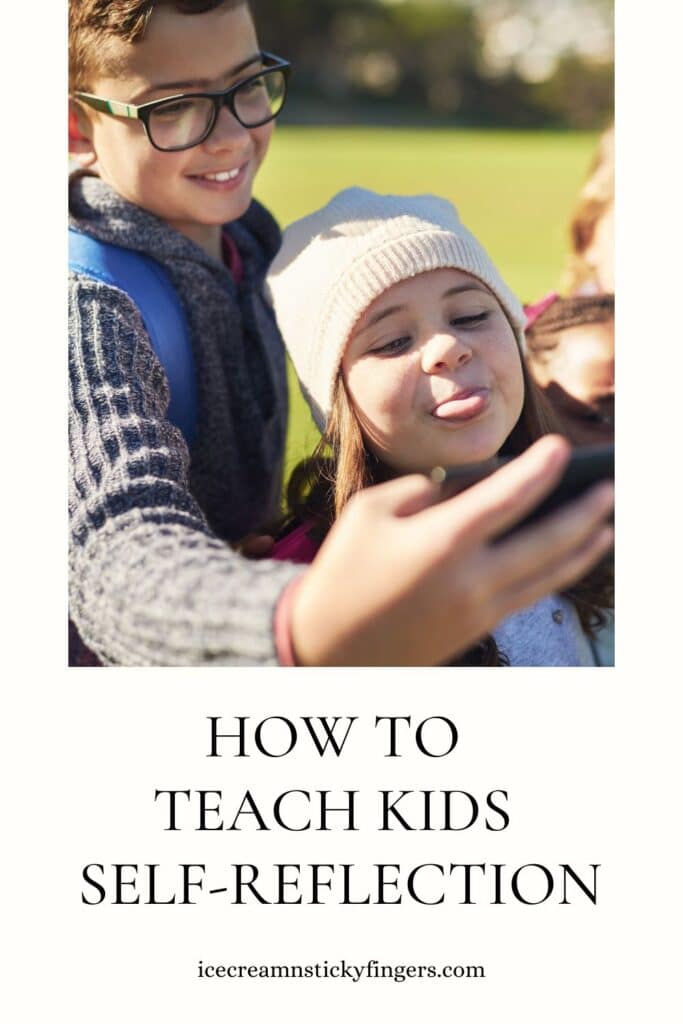Are you wanting to know how to teach kids self-reflection? Teaching kids self-reflection is a valuable skill that can help them develop self-awareness, critical thinking, and personal growth. Here are some suggestions on how to teach kids self-reflection:

Lead By Example
Children often learn best by observing and imitating others. Model self-reflection by openly discussing your own thoughts, emotions, and experiences. Share examples of how you reflect on your actions, decisions, and goals. This can help children understand the concept and see its importance in daily life.
Create a Safe and Supportive Environment
Foster an atmosphere where children feel comfortable expressing their thoughts and emotions without fear of judgment. Encourage open communication and active listening to help them develop the habit of reflecting on their experiences.
Ask Open-Ended Questions
Engage children in conversations that encourage deeper thinking and self-analysis. Ask open-ended questions that prompt them to reflect on their feelings, thoughts, and behaviors. Examples include “How do you think that made you feel?” or “What could you have done differently in that situation?”
Use Guided Prompts
Provide children with guided prompts to help them structure their self-reflection. For example, you can give them a journal or worksheet with questions like, “What made you happy/sad/frustrated today?” or “What choices did you make, and why?”
Encourage Critical Thinking
Help children analyze their thoughts and actions by asking follow-up questions. Encourage them to consider the reasons behind their feelings or behavior. For example, “Why do you think you reacted that way?” or “What other options did you have?”
Encourage Journaling
Provide children with a journal or notebook where they can write down their thoughts, experiences, and reflections. Encourage them to write regularly, whether it’s about their day, their goals, or specific situations they want to reflect on. Journaling can be a private and personal space for self-reflection.

Discuss Emotions and Empathy
Help children understand and recognize their emotions by discussing different feelings and their causes. Encourage empathy by discussing how actions can impact others. This will help them reflect on their own behavior and consider the perspectives and feelings of others.
Teach Problem-Solving Skills
Guide children through problem-solving processes that involve self-reflection. Help them identify challenges, consider possible solutions, and evaluate the outcomes. Encourage them to reflect on what worked and what didn’t, and discuss how they can approach similar situations differently in the future.
Celebrate Successes and Failures
Encourage children to reflect on their achievements and challenges. Celebrate their successes and help them see failures as learning opportunities. By reflecting on both positive and negative experiences, children can gain a deeper understanding of their strengths, weaknesses, and areas for improvement.
Provide Feedback and Encourage Self-Evaluation
Offer constructive feedback to your child, highlighting their strengths and areas for improvement. Encourage them to self-evaluate by asking questions like “What did you learn from this experience?” or “What could you do differently next time?” This helps them develop the habit of reflecting on their actions and choices.
Practice Active Listening
When children share their reflections, practice active listening. Give them your full attention, maintain eye contact, and validate their feelings and thoughts. This encourages them to continue opening up and reflecting.
Reflect Together
Engage in joint reflection activities, such as discussing a movie or book, sharing personal experiences, or reflecting on family events. This not only strengthens your bond but also provides opportunities for shared reflection and learning.
Encourage Goal-Setting
Guide your child in setting realistic goals for themselves. Help them reflect on their progress by regularly reviewing and discussing their goals. This practice promotes self-reflection as they evaluate their efforts, successes, and areas that need improvement.
Practice Mindfulness and Meditation
Introduce mindfulness exercises and meditation techniques to children. These practices can help them develop self-awareness and focus on the present moment. Guided meditation apps or child-friendly resources can be helpful in teaching them these techniques.
Encourage Self-Assessment
Help children set goals and encourage them to assess their progress periodically. Teach them to reflect on their achievements, strengths, and areas where they can improve. This self-assessment can help them develop a growth mindset and take ownership of their learning and personal development.
Remember that teaching self-reflection is an ongoing process. Be patient and provide guidance and support as children develop this valuable skill.








I love the tip about “Problem Solving”. In my opinion, too many parents these days try to solve their children’s problems for them thus providing no learning experience for the child.
This is so important to do. It seems many parents don’t bother with this a lot.
Great post. This is so important and necessary for parents.
This might be good to practice while traveling in the car. This is the one time that I can engage with the teens.
This is such a great post. I think it’s so important to teach kids self reflection. Mindfulness and meditation is such a great one.
Self-reflection is such an important skill, and your tips are practical and easy to follow.
Very informative, this is needed especially in this generation. Thank you sharing this
I love the idea of teaching children goals. If they work for something, that will make them only appreciate it even more.
This is a really great and very informative post! As early as possible we need to teach our kids
Learning how to utilize self-reflection is integral to growing into an emotionally intelligent adult!
Great post! It’s so important to teach our children about self-reflection. This generation needs all the help they can get, and I agree with the tip Lead By Example…that one is very important!!
Self-awareness is definitely a must learn skill, but maybe not the easiest. Some adults still need to learn it! lol
I think that self reflection is maybe the most valuable skill that we can teach kids. Your advice are awesome! Love the open-ended questions to make kids reflect!
It was helpful to have the information you provided. Your sharing of it is greatly appreciated.
Your guide on teaching kids self-reflection is invaluable! The step-by-step approach and practical tips make it so easy for parents and educators. Thank you for helping us nurture self-awareness and emotional intelligence in our children. Wonderful work!
I agree with you that asking open-ended questions makes a difference as this gives the kids the opportunity to think, reflect, and communicate what they truly feel.
My daughter has started journaling and I can see that she is able to process more her thoughts as she writes them.
Thank you for sharing these tips. Will try to practice mindfulness and meditation more.
As an Asian parent, this is something which is very different from what we are used to. But I guess as times are changing, so do our methods of parenting. I have at least learnt a point or two from this post!